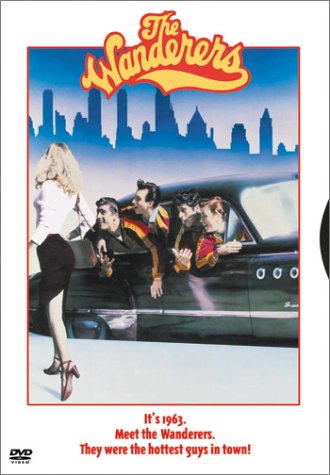Everyone knows that the real power in the North Bronx in ’63 was in the hands of the Italian Bowling League—big men wearing loud Hawaiian sport shirts who treated bowling sharks (who knew there was such a thing?) at Galasso’s Paradise Lanes the way local boys treated Fast Eddie in The Hustler. Dion and the Belmonts were making the greatest rock ‘n roll records of all time, and even the most terminal punks knew better than to mess with the Wongs, the Fordham Baldies or the Ducky Boys (“who roamed their turf like midget dinosaurs, brainless and fearless”).
I have no idea if the North Bronx of Philip Kaufman’s The Wanderers, taken from Richard Price’s novel of the same name, ever existed. It doesn’t matter. For two hours, this movie walks you into a neighborhood that’s scary and sad and hilarious and rings so true you want to step into the screen and crank the jukebox a little higher.
The soundtrack alone is worth the price of admission—it should have made Ben E. King’s “Stand By Me” a comeback hit eight years ago. Better still, Kaufman chose his camera shots with the same loving care he chose his music. There’s hardly a frame in The Wanderers you couldn’t freeze on your VCR and look at like a choice photo from your high school yearbook. Watch for ‘s expression when her boyfriend’s dancing with the new girl; PeeWee’s face when a drunker Terror joins the Marines; Richie Gennaro’s confusion as he looks through the bars in the windows of Gerde’s Folk City at a very young Bob Dylan singing “The Times They Are A-Changin’.”
This film cares about people. People are what neighborhoods—even in the North Bronx—are all about. In the hands of a less capable director, The Wanderers would have been a cartoon of violence and grotesquerie. Thanks to Kaufman, it’s an inner city American Graffiti. Thanks also to Richard Price, whose novel set the tone. Fans of Bruce Springsteen might be grateful that someone’s actually captured the spirit of The Wild, the Innocent, and the E-Street Shuffle on celluloid. For the kids of the North Bronx even the victories are bittersweet, and the defeats often fatal, but at least for this one time no one is patronizing them. In this movie without major actors, there are no minor characters.

